MKT6013: Birmingham City University Sustainable Marketing Report
VerifiedAdded on 2022/08/24
|12
|4271
|25
Report
AI Summary
This report delves into the sustainable marketing practices of McDonald's, an American fast-food corporation, examining the company's efforts to balance social, economic, and environmental considerations. The report identifies key sustainability issues, including the company's impact on global warming through greenhouse gas emissions from cattle farming and deforestation linked to beef and soybean sourcing. Packaging waste is also highlighted as a significant concern. McDonald's responses to these challenges are analyzed, such as efforts to reduce carbon footprints, commitment to sustainable packaging, and recycling programs. The report recommends further actions, including sourcing meat from sustainable resources, investing in research to reduce emissions, and improving supply chain practices to minimize environmental impact. The analysis considers the challenges and opportunities of implementing sustainable marketing strategies within a large-scale global food service brand.
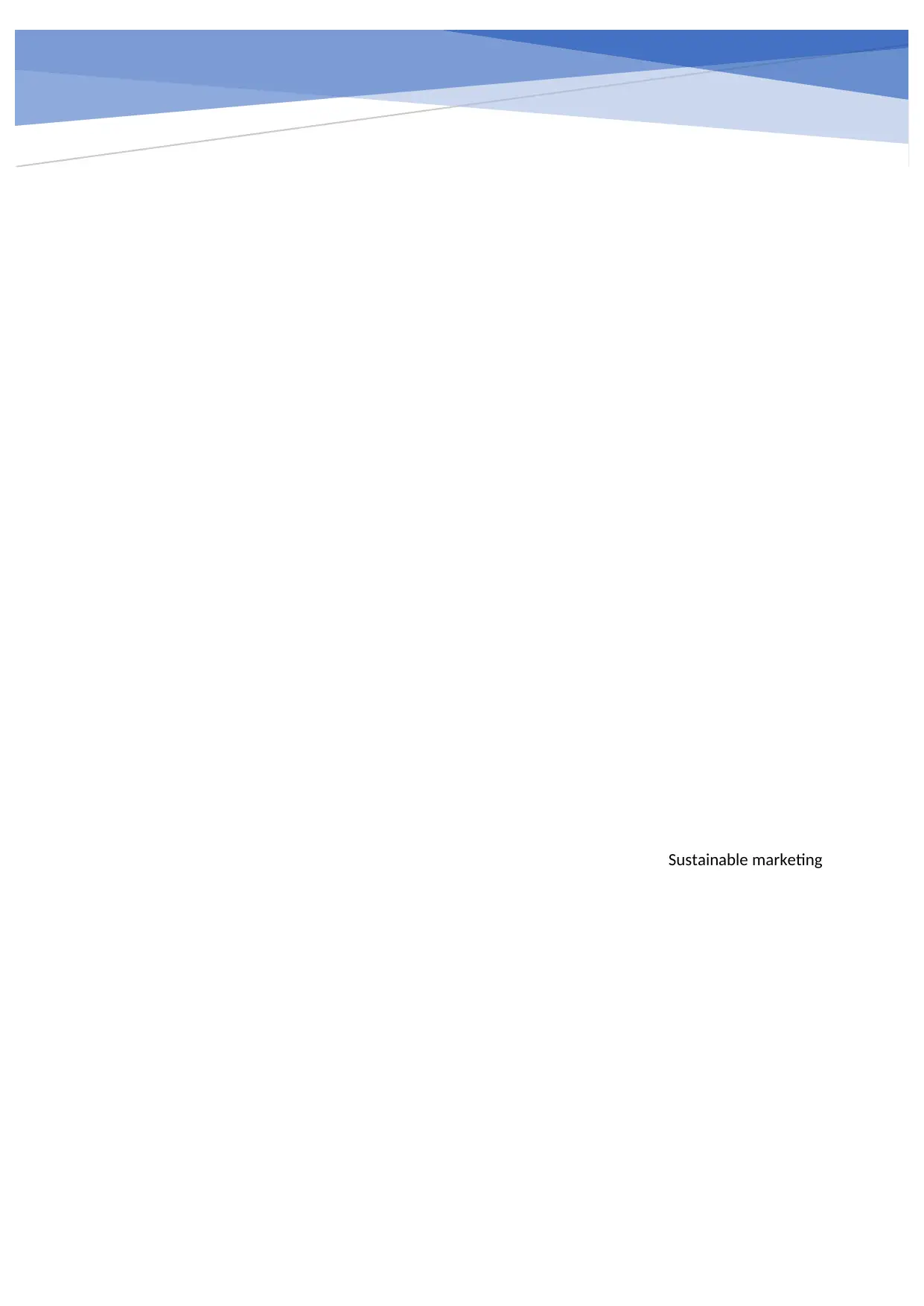
Sustainable marketing
Paraphrase This Document
Need a fresh take? Get an instant paraphrase of this document with our AI Paraphraser
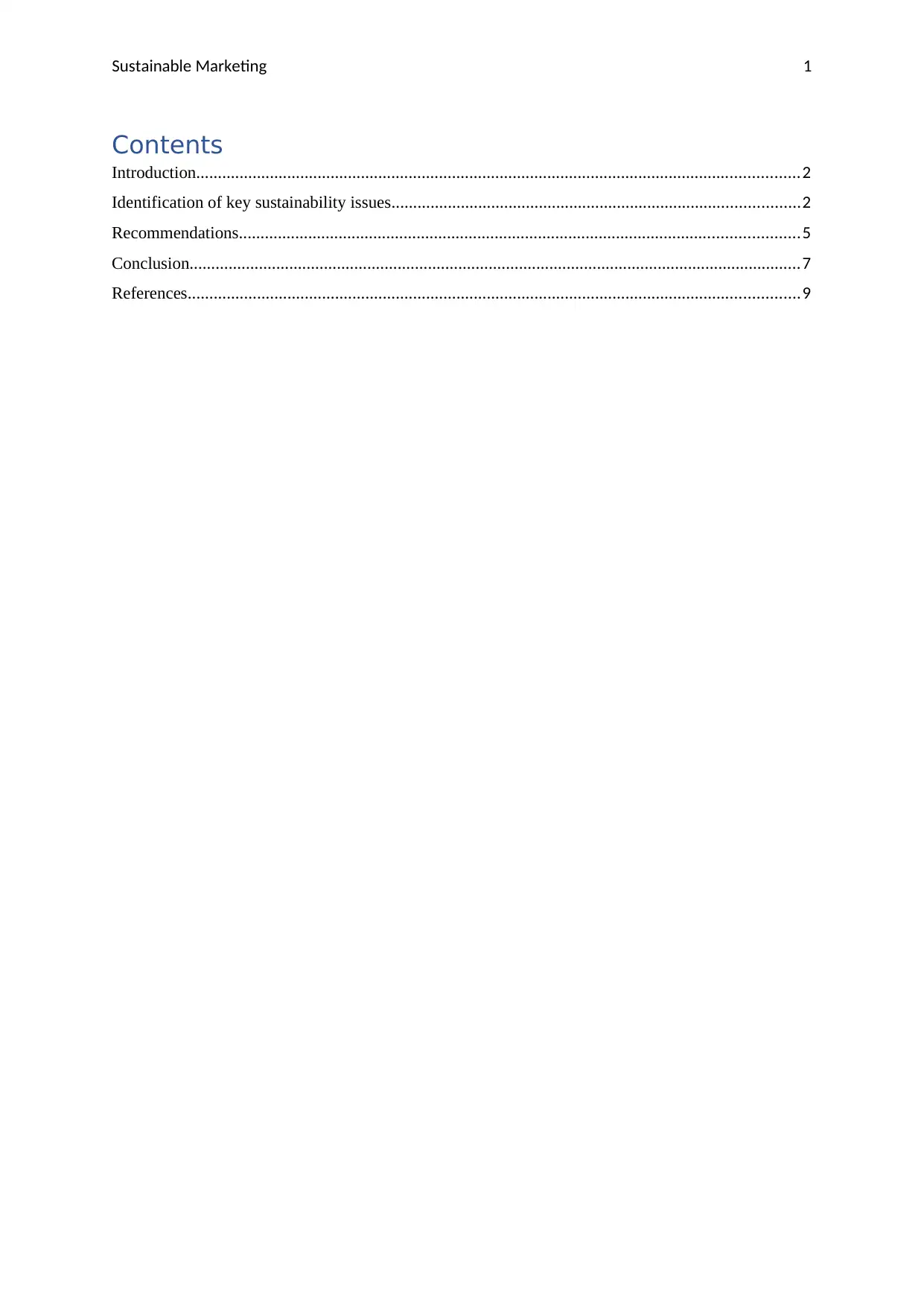
Sustainable Marketing 1
Contents
Introduction...........................................................................................................................................2
Identification of key sustainability issues..............................................................................................2
Recommendations.................................................................................................................................5
Conclusion.............................................................................................................................................7
References.............................................................................................................................................9
Contents
Introduction...........................................................................................................................................2
Identification of key sustainability issues..............................................................................................2
Recommendations.................................................................................................................................5
Conclusion.............................................................................................................................................7
References.............................................................................................................................................9
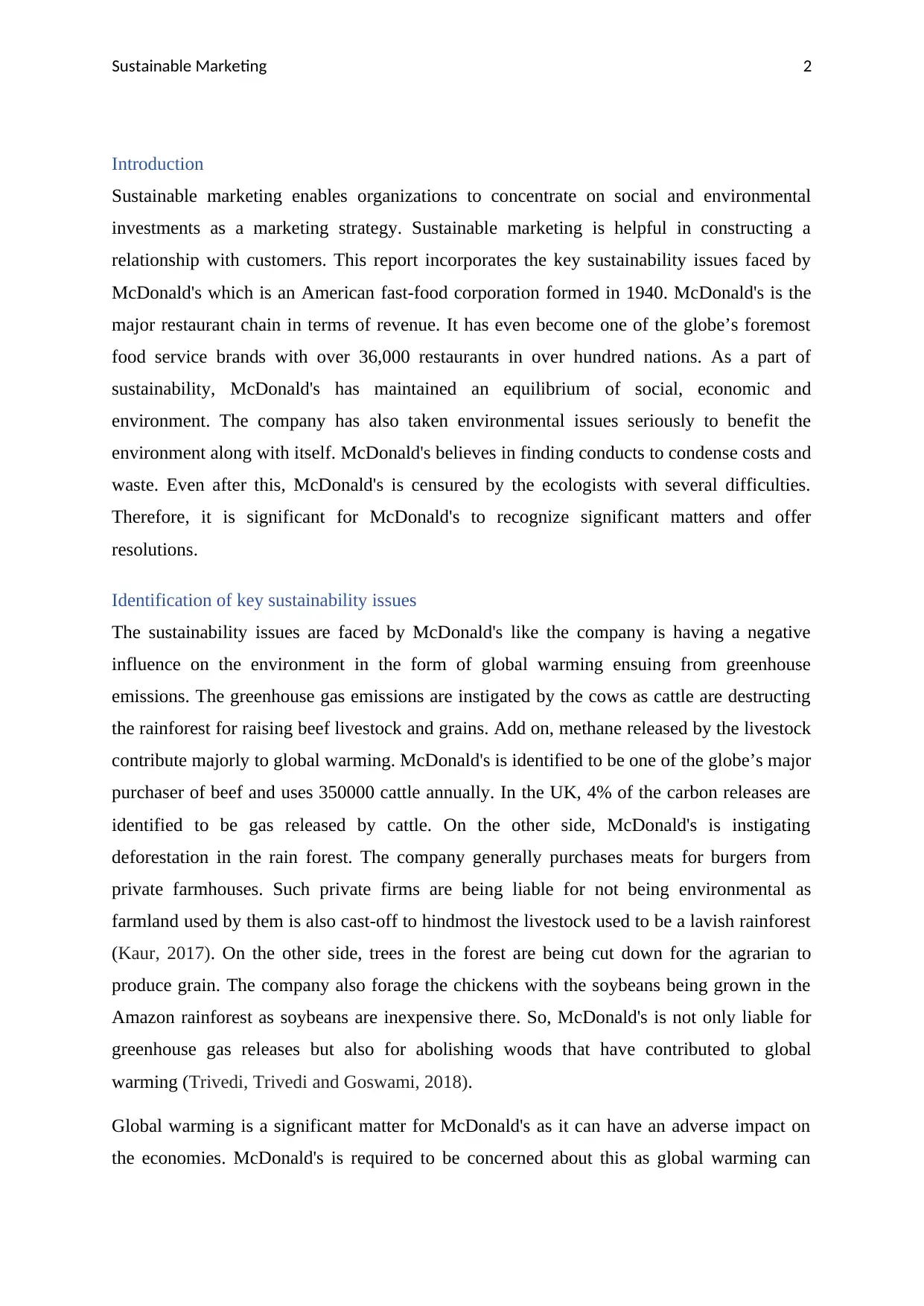
Sustainable Marketing 2
Introduction
Sustainable marketing enables organizations to concentrate on social and environmental
investments as a marketing strategy. Sustainable marketing is helpful in constructing a
relationship with customers. This report incorporates the key sustainability issues faced by
McDonald's which is an American fast-food corporation formed in 1940. McDonald's is the
major restaurant chain in terms of revenue. It has even become one of the globe’s foremost
food service brands with over 36,000 restaurants in over hundred nations. As a part of
sustainability, McDonald's has maintained an equilibrium of social, economic and
environment. The company has also taken environmental issues seriously to benefit the
environment along with itself. McDonald's believes in finding conducts to condense costs and
waste. Even after this, McDonald's is censured by the ecologists with several difficulties.
Therefore, it is significant for McDonald's to recognize significant matters and offer
resolutions.
Identification of key sustainability issues
The sustainability issues are faced by McDonald's like the company is having a negative
influence on the environment in the form of global warming ensuing from greenhouse
emissions. The greenhouse gas emissions are instigated by the cows as cattle are destructing
the rainforest for raising beef livestock and grains. Add on, methane released by the livestock
contribute majorly to global warming. McDonald's is identified to be one of the globe’s major
purchaser of beef and uses 350000 cattle annually. In the UK, 4% of the carbon releases are
identified to be gas released by cattle. On the other side, McDonald's is instigating
deforestation in the rain forest. The company generally purchases meats for burgers from
private farmhouses. Such private firms are being liable for not being environmental as
farmland used by them is also cast-off to hindmost the livestock used to be a lavish rainforest
(Kaur, 2017). On the other side, trees in the forest are being cut down for the agrarian to
produce grain. The company also forage the chickens with the soybeans being grown in the
Amazon rainforest as soybeans are inexpensive there. So, McDonald's is not only liable for
greenhouse gas releases but also for abolishing woods that have contributed to global
warming (Trivedi, Trivedi and Goswami, 2018).
Global warming is a significant matter for McDonald's as it can have an adverse impact on
the economies. McDonald's is required to be concerned about this as global warming can
Introduction
Sustainable marketing enables organizations to concentrate on social and environmental
investments as a marketing strategy. Sustainable marketing is helpful in constructing a
relationship with customers. This report incorporates the key sustainability issues faced by
McDonald's which is an American fast-food corporation formed in 1940. McDonald's is the
major restaurant chain in terms of revenue. It has even become one of the globe’s foremost
food service brands with over 36,000 restaurants in over hundred nations. As a part of
sustainability, McDonald's has maintained an equilibrium of social, economic and
environment. The company has also taken environmental issues seriously to benefit the
environment along with itself. McDonald's believes in finding conducts to condense costs and
waste. Even after this, McDonald's is censured by the ecologists with several difficulties.
Therefore, it is significant for McDonald's to recognize significant matters and offer
resolutions.
Identification of key sustainability issues
The sustainability issues are faced by McDonald's like the company is having a negative
influence on the environment in the form of global warming ensuing from greenhouse
emissions. The greenhouse gas emissions are instigated by the cows as cattle are destructing
the rainforest for raising beef livestock and grains. Add on, methane released by the livestock
contribute majorly to global warming. McDonald's is identified to be one of the globe’s major
purchaser of beef and uses 350000 cattle annually. In the UK, 4% of the carbon releases are
identified to be gas released by cattle. On the other side, McDonald's is instigating
deforestation in the rain forest. The company generally purchases meats for burgers from
private farmhouses. Such private firms are being liable for not being environmental as
farmland used by them is also cast-off to hindmost the livestock used to be a lavish rainforest
(Kaur, 2017). On the other side, trees in the forest are being cut down for the agrarian to
produce grain. The company also forage the chickens with the soybeans being grown in the
Amazon rainforest as soybeans are inexpensive there. So, McDonald's is not only liable for
greenhouse gas releases but also for abolishing woods that have contributed to global
warming (Trivedi, Trivedi and Goswami, 2018).
Global warming is a significant matter for McDonald's as it can have an adverse impact on
the economies. McDonald's is required to be concerned about this as global warming can
⊘ This is a preview!⊘
Do you want full access?
Subscribe today to unlock all pages.

Trusted by 1+ million students worldwide
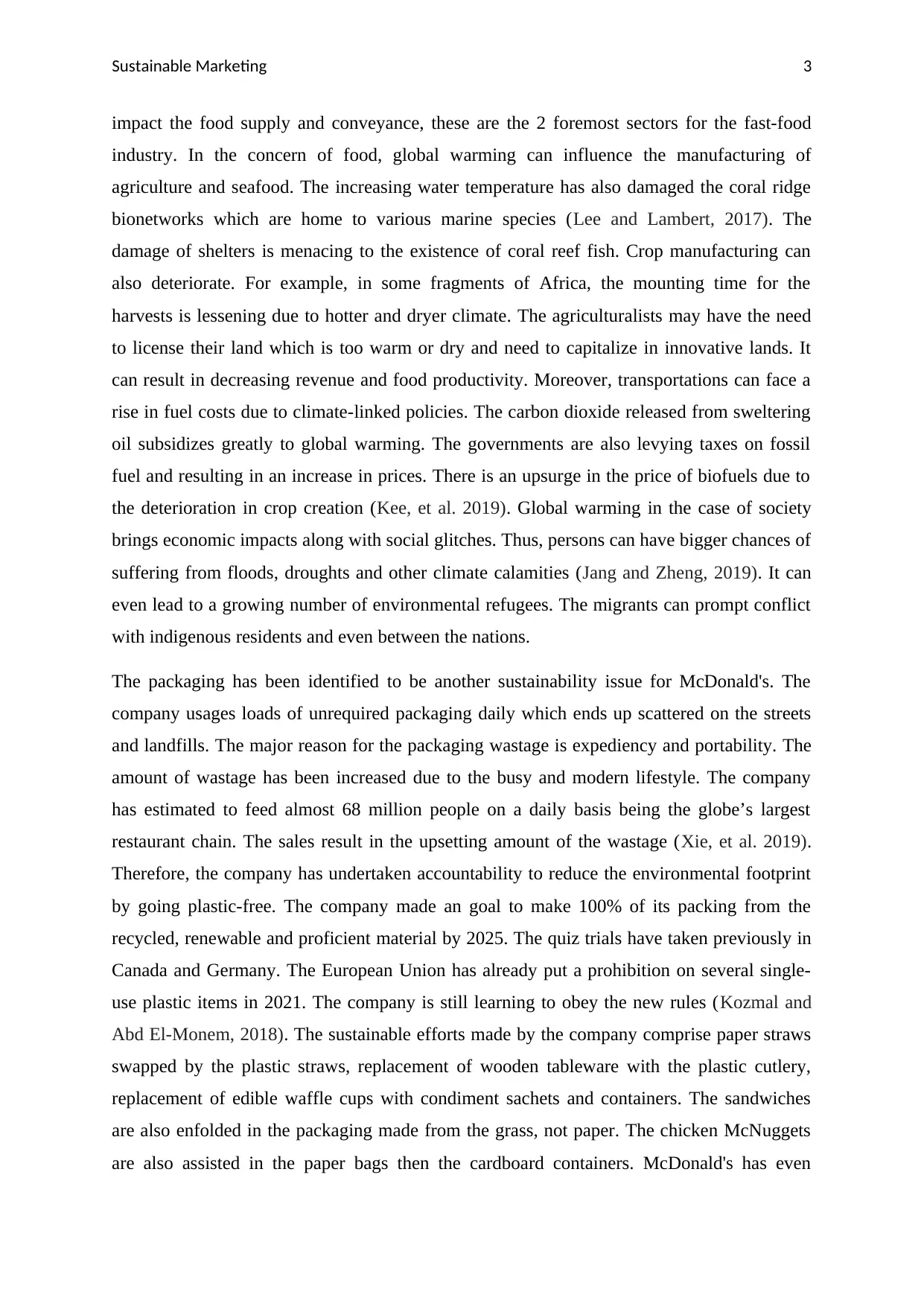
Sustainable Marketing 3
impact the food supply and conveyance, these are the 2 foremost sectors for the fast-food
industry. In the concern of food, global warming can influence the manufacturing of
agriculture and seafood. The increasing water temperature has also damaged the coral ridge
bionetworks which are home to various marine species (Lee and Lambert, 2017). The
damage of shelters is menacing to the existence of coral reef fish. Crop manufacturing can
also deteriorate. For example, in some fragments of Africa, the mounting time for the
harvests is lessening due to hotter and dryer climate. The agriculturalists may have the need
to license their land which is too warm or dry and need to capitalize in innovative lands. It
can result in decreasing revenue and food productivity. Moreover, transportations can face a
rise in fuel costs due to climate-linked policies. The carbon dioxide released from sweltering
oil subsidizes greatly to global warming. The governments are also levying taxes on fossil
fuel and resulting in an increase in prices. There is an upsurge in the price of biofuels due to
the deterioration in crop creation (Kee, et al. 2019). Global warming in the case of society
brings economic impacts along with social glitches. Thus, persons can have bigger chances of
suffering from floods, droughts and other climate calamities (Jang and Zheng, 2019). It can
even lead to a growing number of environmental refugees. The migrants can prompt conflict
with indigenous residents and even between the nations.
The packaging has been identified to be another sustainability issue for McDonald's. The
company usages loads of unrequired packaging daily which ends up scattered on the streets
and landfills. The major reason for the packaging wastage is expediency and portability. The
amount of wastage has been increased due to the busy and modern lifestyle. The company
has estimated to feed almost 68 million people on a daily basis being the globe’s largest
restaurant chain. The sales result in the upsetting amount of the wastage (Xie, et al. 2019).
Therefore, the company has undertaken accountability to reduce the environmental footprint
by going plastic-free. The company made an goal to make 100% of its packing from the
recycled, renewable and proficient material by 2025. The quiz trials have taken previously in
Canada and Germany. The European Union has already put a prohibition on several single-
use plastic items in 2021. The company is still learning to obey the new rules (Kozmal and
Abd El-Monem, 2018). The sustainable efforts made by the company comprise paper straws
swapped by the plastic straws, replacement of wooden tableware with the plastic cutlery,
replacement of edible waffle cups with condiment sachets and containers. The sandwiches
are also enfolded in the packaging made from the grass, not paper. The chicken McNuggets
are also assisted in the paper bags then the cardboard containers. McDonald's has even
impact the food supply and conveyance, these are the 2 foremost sectors for the fast-food
industry. In the concern of food, global warming can influence the manufacturing of
agriculture and seafood. The increasing water temperature has also damaged the coral ridge
bionetworks which are home to various marine species (Lee and Lambert, 2017). The
damage of shelters is menacing to the existence of coral reef fish. Crop manufacturing can
also deteriorate. For example, in some fragments of Africa, the mounting time for the
harvests is lessening due to hotter and dryer climate. The agriculturalists may have the need
to license their land which is too warm or dry and need to capitalize in innovative lands. It
can result in decreasing revenue and food productivity. Moreover, transportations can face a
rise in fuel costs due to climate-linked policies. The carbon dioxide released from sweltering
oil subsidizes greatly to global warming. The governments are also levying taxes on fossil
fuel and resulting in an increase in prices. There is an upsurge in the price of biofuels due to
the deterioration in crop creation (Kee, et al. 2019). Global warming in the case of society
brings economic impacts along with social glitches. Thus, persons can have bigger chances of
suffering from floods, droughts and other climate calamities (Jang and Zheng, 2019). It can
even lead to a growing number of environmental refugees. The migrants can prompt conflict
with indigenous residents and even between the nations.
The packaging has been identified to be another sustainability issue for McDonald's. The
company usages loads of unrequired packaging daily which ends up scattered on the streets
and landfills. The major reason for the packaging wastage is expediency and portability. The
amount of wastage has been increased due to the busy and modern lifestyle. The company
has estimated to feed almost 68 million people on a daily basis being the globe’s largest
restaurant chain. The sales result in the upsetting amount of the wastage (Xie, et al. 2019).
Therefore, the company has undertaken accountability to reduce the environmental footprint
by going plastic-free. The company made an goal to make 100% of its packing from the
recycled, renewable and proficient material by 2025. The quiz trials have taken previously in
Canada and Germany. The European Union has already put a prohibition on several single-
use plastic items in 2021. The company is still learning to obey the new rules (Kozmal and
Abd El-Monem, 2018). The sustainable efforts made by the company comprise paper straws
swapped by the plastic straws, replacement of wooden tableware with the plastic cutlery,
replacement of edible waffle cups with condiment sachets and containers. The sandwiches
are also enfolded in the packaging made from the grass, not paper. The chicken McNuggets
are also assisted in the paper bags then the cardboard containers. McDonald's has even
Paraphrase This Document
Need a fresh take? Get an instant paraphrase of this document with our AI Paraphraser
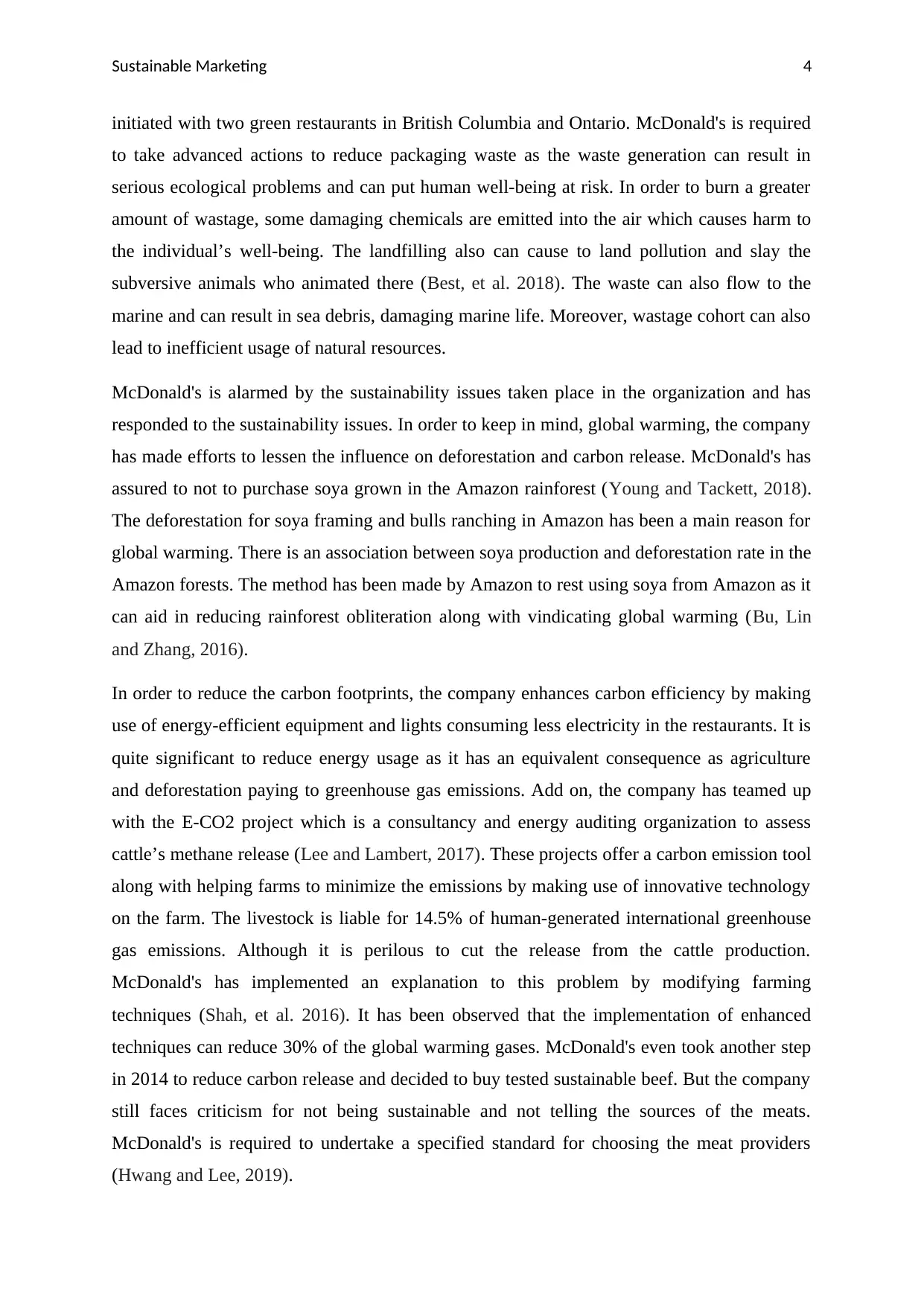
Sustainable Marketing 4
initiated with two green restaurants in British Columbia and Ontario. McDonald's is required
to take advanced actions to reduce packaging waste as the waste generation can result in
serious ecological problems and can put human well-being at risk. In order to burn a greater
amount of wastage, some damaging chemicals are emitted into the air which causes harm to
the individual’s well-being. The landfilling also can cause to land pollution and slay the
subversive animals who animated there (Best, et al. 2018). The waste can also flow to the
marine and can result in sea debris, damaging marine life. Moreover, wastage cohort can also
lead to inefficient usage of natural resources.
McDonald's is alarmed by the sustainability issues taken place in the organization and has
responded to the sustainability issues. In order to keep in mind, global warming, the company
has made efforts to lessen the influence on deforestation and carbon release. McDonald's has
assured to not to purchase soya grown in the Amazon rainforest (Young and Tackett, 2018).
The deforestation for soya framing and bulls ranching in Amazon has been a main reason for
global warming. There is an association between soya production and deforestation rate in the
Amazon forests. The method has been made by Amazon to rest using soya from Amazon as it
can aid in reducing rainforest obliteration along with vindicating global warming (Bu, Lin
and Zhang, 2016).
In order to reduce the carbon footprints, the company enhances carbon efficiency by making
use of energy-efficient equipment and lights consuming less electricity in the restaurants. It is
quite significant to reduce energy usage as it has an equivalent consequence as agriculture
and deforestation paying to greenhouse gas emissions. Add on, the company has teamed up
with the E-CO2 project which is a consultancy and energy auditing organization to assess
cattle’s methane release (Lee and Lambert, 2017). These projects offer a carbon emission tool
along with helping farms to minimize the emissions by making use of innovative technology
on the farm. The livestock is liable for 14.5% of human-generated international greenhouse
gas emissions. Although it is perilous to cut the release from the cattle production.
McDonald's has implemented an explanation to this problem by modifying farming
techniques (Shah, et al. 2016). It has been observed that the implementation of enhanced
techniques can reduce 30% of the global warming gases. McDonald's even took another step
in 2014 to reduce carbon release and decided to buy tested sustainable beef. But the company
still faces criticism for not being sustainable and not telling the sources of the meats.
McDonald's is required to undertake a specified standard for choosing the meat providers
(Hwang and Lee, 2019).
initiated with two green restaurants in British Columbia and Ontario. McDonald's is required
to take advanced actions to reduce packaging waste as the waste generation can result in
serious ecological problems and can put human well-being at risk. In order to burn a greater
amount of wastage, some damaging chemicals are emitted into the air which causes harm to
the individual’s well-being. The landfilling also can cause to land pollution and slay the
subversive animals who animated there (Best, et al. 2018). The waste can also flow to the
marine and can result in sea debris, damaging marine life. Moreover, wastage cohort can also
lead to inefficient usage of natural resources.
McDonald's is alarmed by the sustainability issues taken place in the organization and has
responded to the sustainability issues. In order to keep in mind, global warming, the company
has made efforts to lessen the influence on deforestation and carbon release. McDonald's has
assured to not to purchase soya grown in the Amazon rainforest (Young and Tackett, 2018).
The deforestation for soya framing and bulls ranching in Amazon has been a main reason for
global warming. There is an association between soya production and deforestation rate in the
Amazon forests. The method has been made by Amazon to rest using soya from Amazon as it
can aid in reducing rainforest obliteration along with vindicating global warming (Bu, Lin
and Zhang, 2016).
In order to reduce the carbon footprints, the company enhances carbon efficiency by making
use of energy-efficient equipment and lights consuming less electricity in the restaurants. It is
quite significant to reduce energy usage as it has an equivalent consequence as agriculture
and deforestation paying to greenhouse gas emissions. Add on, the company has teamed up
with the E-CO2 project which is a consultancy and energy auditing organization to assess
cattle’s methane release (Lee and Lambert, 2017). These projects offer a carbon emission tool
along with helping farms to minimize the emissions by making use of innovative technology
on the farm. The livestock is liable for 14.5% of human-generated international greenhouse
gas emissions. Although it is perilous to cut the release from the cattle production.
McDonald's has implemented an explanation to this problem by modifying farming
techniques (Shah, et al. 2016). It has been observed that the implementation of enhanced
techniques can reduce 30% of the global warming gases. McDonald's even took another step
in 2014 to reduce carbon release and decided to buy tested sustainable beef. But the company
still faces criticism for not being sustainable and not telling the sources of the meats.
McDonald's is required to undertake a specified standard for choosing the meat providers
(Hwang and Lee, 2019).
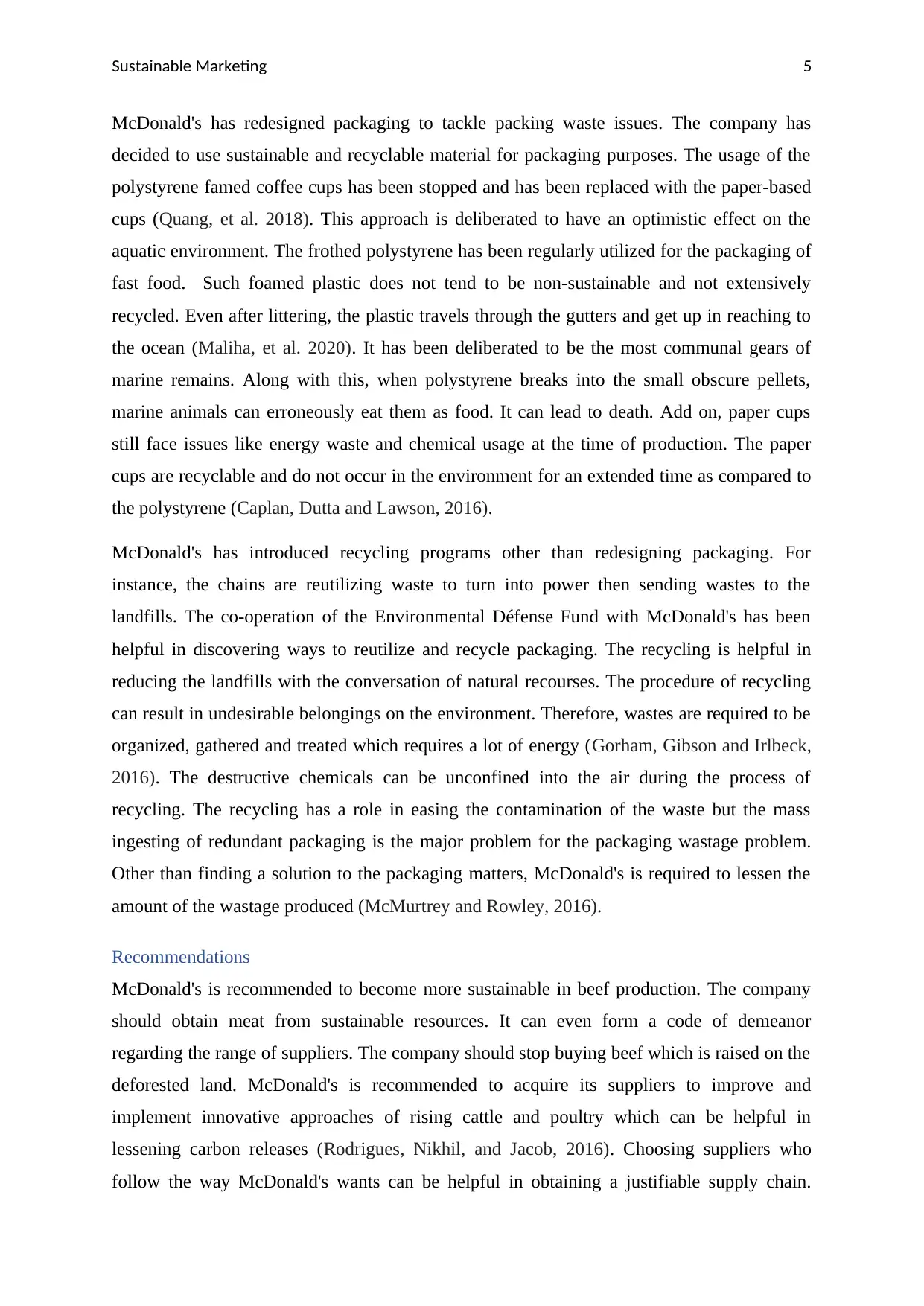
Sustainable Marketing 5
McDonald's has redesigned packaging to tackle packing waste issues. The company has
decided to use sustainable and recyclable material for packaging purposes. The usage of the
polystyrene famed coffee cups has been stopped and has been replaced with the paper-based
cups (Quang, et al. 2018). This approach is deliberated to have an optimistic effect on the
aquatic environment. The frothed polystyrene has been regularly utilized for the packaging of
fast food. Such foamed plastic does not tend to be non-sustainable and not extensively
recycled. Even after littering, the plastic travels through the gutters and get up in reaching to
the ocean (Maliha, et al. 2020). It has been deliberated to be the most communal gears of
marine remains. Along with this, when polystyrene breaks into the small obscure pellets,
marine animals can erroneously eat them as food. It can lead to death. Add on, paper cups
still face issues like energy waste and chemical usage at the time of production. The paper
cups are recyclable and do not occur in the environment for an extended time as compared to
the polystyrene (Caplan, Dutta and Lawson, 2016).
McDonald's has introduced recycling programs other than redesigning packaging. For
instance, the chains are reutilizing waste to turn into power then sending wastes to the
landfills. The co-operation of the Environmental Défense Fund with McDonald's has been
helpful in discovering ways to reutilize and recycle packaging. The recycling is helpful in
reducing the landfills with the conversation of natural recourses. The procedure of recycling
can result in undesirable belongings on the environment. Therefore, wastes are required to be
organized, gathered and treated which requires a lot of energy (Gorham, Gibson and Irlbeck,
2016). The destructive chemicals can be unconfined into the air during the process of
recycling. The recycling has a role in easing the contamination of the waste but the mass
ingesting of redundant packaging is the major problem for the packaging wastage problem.
Other than finding a solution to the packaging matters, McDonald's is required to lessen the
amount of the wastage produced (McMurtrey and Rowley, 2016).
Recommendations
McDonald's is recommended to become more sustainable in beef production. The company
should obtain meat from sustainable resources. It can even form a code of demeanor
regarding the range of suppliers. The company should stop buying beef which is raised on the
deforested land. McDonald's is recommended to acquire its suppliers to improve and
implement innovative approaches of rising cattle and poultry which can be helpful in
lessening carbon releases (Rodrigues, Nikhil, and Jacob, 2016). Choosing suppliers who
follow the way McDonald's wants can be helpful in obtaining a justifiable supply chain.
McDonald's has redesigned packaging to tackle packing waste issues. The company has
decided to use sustainable and recyclable material for packaging purposes. The usage of the
polystyrene famed coffee cups has been stopped and has been replaced with the paper-based
cups (Quang, et al. 2018). This approach is deliberated to have an optimistic effect on the
aquatic environment. The frothed polystyrene has been regularly utilized for the packaging of
fast food. Such foamed plastic does not tend to be non-sustainable and not extensively
recycled. Even after littering, the plastic travels through the gutters and get up in reaching to
the ocean (Maliha, et al. 2020). It has been deliberated to be the most communal gears of
marine remains. Along with this, when polystyrene breaks into the small obscure pellets,
marine animals can erroneously eat them as food. It can lead to death. Add on, paper cups
still face issues like energy waste and chemical usage at the time of production. The paper
cups are recyclable and do not occur in the environment for an extended time as compared to
the polystyrene (Caplan, Dutta and Lawson, 2016).
McDonald's has introduced recycling programs other than redesigning packaging. For
instance, the chains are reutilizing waste to turn into power then sending wastes to the
landfills. The co-operation of the Environmental Défense Fund with McDonald's has been
helpful in discovering ways to reutilize and recycle packaging. The recycling is helpful in
reducing the landfills with the conversation of natural recourses. The procedure of recycling
can result in undesirable belongings on the environment. Therefore, wastes are required to be
organized, gathered and treated which requires a lot of energy (Gorham, Gibson and Irlbeck,
2016). The destructive chemicals can be unconfined into the air during the process of
recycling. The recycling has a role in easing the contamination of the waste but the mass
ingesting of redundant packaging is the major problem for the packaging wastage problem.
Other than finding a solution to the packaging matters, McDonald's is required to lessen the
amount of the wastage produced (McMurtrey and Rowley, 2016).
Recommendations
McDonald's is recommended to become more sustainable in beef production. The company
should obtain meat from sustainable resources. It can even form a code of demeanor
regarding the range of suppliers. The company should stop buying beef which is raised on the
deforested land. McDonald's is recommended to acquire its suppliers to improve and
implement innovative approaches of rising cattle and poultry which can be helpful in
lessening carbon releases (Rodrigues, Nikhil, and Jacob, 2016). Choosing suppliers who
follow the way McDonald's wants can be helpful in obtaining a justifiable supply chain.
⊘ This is a preview!⊘
Do you want full access?
Subscribe today to unlock all pages.

Trusted by 1+ million students worldwide
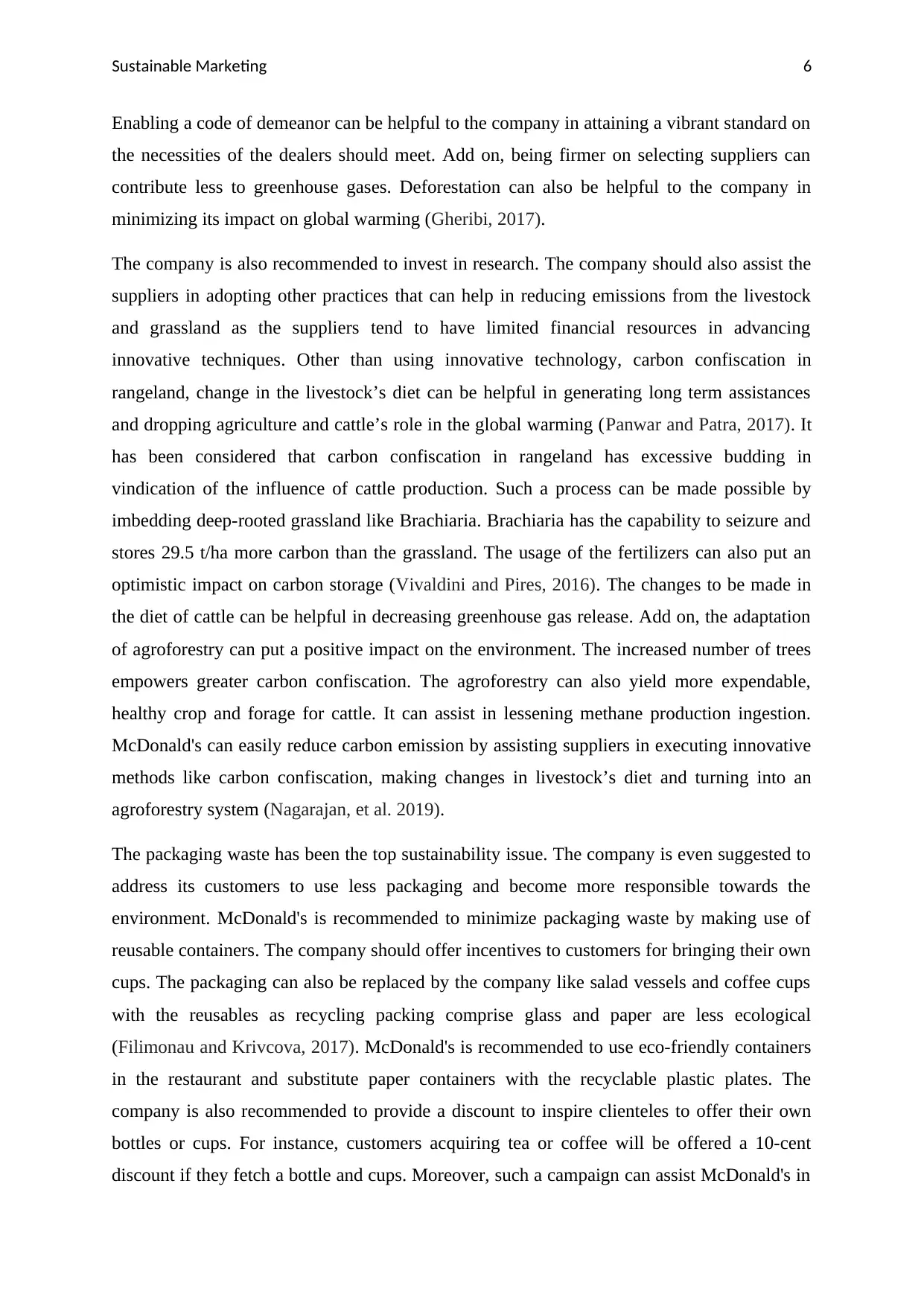
Sustainable Marketing 6
Enabling a code of demeanor can be helpful to the company in attaining a vibrant standard on
the necessities of the dealers should meet. Add on, being firmer on selecting suppliers can
contribute less to greenhouse gases. Deforestation can also be helpful to the company in
minimizing its impact on global warming (Gheribi, 2017).
The company is also recommended to invest in research. The company should also assist the
suppliers in adopting other practices that can help in reducing emissions from the livestock
and grassland as the suppliers tend to have limited financial resources in advancing
innovative techniques. Other than using innovative technology, carbon confiscation in
rangeland, change in the livestock’s diet can be helpful in generating long term assistances
and dropping agriculture and cattle’s role in the global warming (Panwar and Patra, 2017). It
has been considered that carbon confiscation in rangeland has excessive budding in
vindication of the influence of cattle production. Such a process can be made possible by
imbedding deep-rooted grassland like Brachiaria. Brachiaria has the capability to seizure and
stores 29.5 t/ha more carbon than the grassland. The usage of the fertilizers can also put an
optimistic impact on carbon storage (Vivaldini and Pires, 2016). The changes to be made in
the diet of cattle can be helpful in decreasing greenhouse gas release. Add on, the adaptation
of agroforestry can put a positive impact on the environment. The increased number of trees
empowers greater carbon confiscation. The agroforestry can also yield more expendable,
healthy crop and forage for cattle. It can assist in lessening methane production ingestion.
McDonald's can easily reduce carbon emission by assisting suppliers in executing innovative
methods like carbon confiscation, making changes in livestock’s diet and turning into an
agroforestry system (Nagarajan, et al. 2019).
The packaging waste has been the top sustainability issue. The company is even suggested to
address its customers to use less packaging and become more responsible towards the
environment. McDonald's is recommended to minimize packaging waste by making use of
reusable containers. The company should offer incentives to customers for bringing their own
cups. The packaging can also be replaced by the company like salad vessels and coffee cups
with the reusables as recycling packing comprise glass and paper are less ecological
(Filimonau and Krivcova, 2017). McDonald's is recommended to use eco-friendly containers
in the restaurant and substitute paper containers with the recyclable plastic plates. The
company is also recommended to provide a discount to inspire clienteles to offer their own
bottles or cups. For instance, customers acquiring tea or coffee will be offered a 10-cent
discount if they fetch a bottle and cups. Moreover, such a campaign can assist McDonald's in
Enabling a code of demeanor can be helpful to the company in attaining a vibrant standard on
the necessities of the dealers should meet. Add on, being firmer on selecting suppliers can
contribute less to greenhouse gases. Deforestation can also be helpful to the company in
minimizing its impact on global warming (Gheribi, 2017).
The company is also recommended to invest in research. The company should also assist the
suppliers in adopting other practices that can help in reducing emissions from the livestock
and grassland as the suppliers tend to have limited financial resources in advancing
innovative techniques. Other than using innovative technology, carbon confiscation in
rangeland, change in the livestock’s diet can be helpful in generating long term assistances
and dropping agriculture and cattle’s role in the global warming (Panwar and Patra, 2017). It
has been considered that carbon confiscation in rangeland has excessive budding in
vindication of the influence of cattle production. Such a process can be made possible by
imbedding deep-rooted grassland like Brachiaria. Brachiaria has the capability to seizure and
stores 29.5 t/ha more carbon than the grassland. The usage of the fertilizers can also put an
optimistic impact on carbon storage (Vivaldini and Pires, 2016). The changes to be made in
the diet of cattle can be helpful in decreasing greenhouse gas release. Add on, the adaptation
of agroforestry can put a positive impact on the environment. The increased number of trees
empowers greater carbon confiscation. The agroforestry can also yield more expendable,
healthy crop and forage for cattle. It can assist in lessening methane production ingestion.
McDonald's can easily reduce carbon emission by assisting suppliers in executing innovative
methods like carbon confiscation, making changes in livestock’s diet and turning into an
agroforestry system (Nagarajan, et al. 2019).
The packaging waste has been the top sustainability issue. The company is even suggested to
address its customers to use less packaging and become more responsible towards the
environment. McDonald's is recommended to minimize packaging waste by making use of
reusable containers. The company should offer incentives to customers for bringing their own
cups. The packaging can also be replaced by the company like salad vessels and coffee cups
with the reusables as recycling packing comprise glass and paper are less ecological
(Filimonau and Krivcova, 2017). McDonald's is recommended to use eco-friendly containers
in the restaurant and substitute paper containers with the recyclable plastic plates. The
company is also recommended to provide a discount to inspire clienteles to offer their own
bottles or cups. For instance, customers acquiring tea or coffee will be offered a 10-cent
discount if they fetch a bottle and cups. Moreover, such a campaign can assist McDonald's in
Paraphrase This Document
Need a fresh take? Get an instant paraphrase of this document with our AI Paraphraser
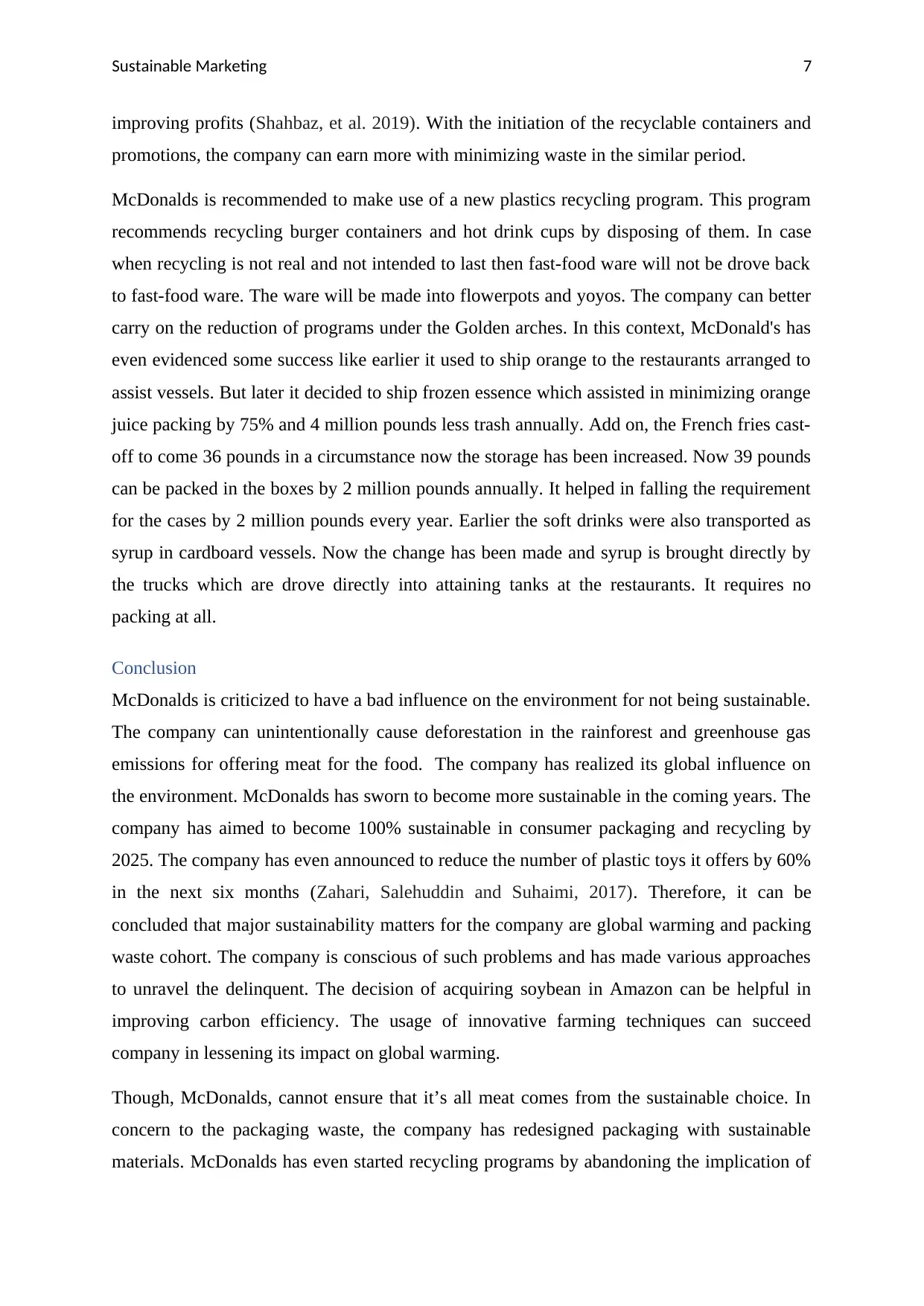
Sustainable Marketing 7
improving profits (Shahbaz, et al. 2019). With the initiation of the recyclable containers and
promotions, the company can earn more with minimizing waste in the similar period.
McDonalds is recommended to make use of a new plastics recycling program. This program
recommends recycling burger containers and hot drink cups by disposing of them. In case
when recycling is not real and not intended to last then fast-food ware will not be drove back
to fast-food ware. The ware will be made into flowerpots and yoyos. The company can better
carry on the reduction of programs under the Golden arches. In this context, McDonald's has
even evidenced some success like earlier it used to ship orange to the restaurants arranged to
assist vessels. But later it decided to ship frozen essence which assisted in minimizing orange
juice packing by 75% and 4 million pounds less trash annually. Add on, the French fries cast-
off to come 36 pounds in a circumstance now the storage has been increased. Now 39 pounds
can be packed in the boxes by 2 million pounds annually. It helped in falling the requirement
for the cases by 2 million pounds every year. Earlier the soft drinks were also transported as
syrup in cardboard vessels. Now the change has been made and syrup is brought directly by
the trucks which are drove directly into attaining tanks at the restaurants. It requires no
packing at all.
Conclusion
McDonalds is criticized to have a bad influence on the environment for not being sustainable.
The company can unintentionally cause deforestation in the rainforest and greenhouse gas
emissions for offering meat for the food. The company has realized its global influence on
the environment. McDonalds has sworn to become more sustainable in the coming years. The
company has aimed to become 100% sustainable in consumer packaging and recycling by
2025. The company has even announced to reduce the number of plastic toys it offers by 60%
in the next six months (Zahari, Salehuddin and Suhaimi, 2017). Therefore, it can be
concluded that major sustainability matters for the company are global warming and packing
waste cohort. The company is conscious of such problems and has made various approaches
to unravel the delinquent. The decision of acquiring soybean in Amazon can be helpful in
improving carbon efficiency. The usage of innovative farming techniques can succeed
company in lessening its impact on global warming.
Though, McDonalds, cannot ensure that it’s all meat comes from the sustainable choice. In
concern to the packaging waste, the company has redesigned packaging with sustainable
materials. McDonalds has even started recycling programs by abandoning the implication of
improving profits (Shahbaz, et al. 2019). With the initiation of the recyclable containers and
promotions, the company can earn more with minimizing waste in the similar period.
McDonalds is recommended to make use of a new plastics recycling program. This program
recommends recycling burger containers and hot drink cups by disposing of them. In case
when recycling is not real and not intended to last then fast-food ware will not be drove back
to fast-food ware. The ware will be made into flowerpots and yoyos. The company can better
carry on the reduction of programs under the Golden arches. In this context, McDonald's has
even evidenced some success like earlier it used to ship orange to the restaurants arranged to
assist vessels. But later it decided to ship frozen essence which assisted in minimizing orange
juice packing by 75% and 4 million pounds less trash annually. Add on, the French fries cast-
off to come 36 pounds in a circumstance now the storage has been increased. Now 39 pounds
can be packed in the boxes by 2 million pounds annually. It helped in falling the requirement
for the cases by 2 million pounds every year. Earlier the soft drinks were also transported as
syrup in cardboard vessels. Now the change has been made and syrup is brought directly by
the trucks which are drove directly into attaining tanks at the restaurants. It requires no
packing at all.
Conclusion
McDonalds is criticized to have a bad influence on the environment for not being sustainable.
The company can unintentionally cause deforestation in the rainforest and greenhouse gas
emissions for offering meat for the food. The company has realized its global influence on
the environment. McDonalds has sworn to become more sustainable in the coming years. The
company has aimed to become 100% sustainable in consumer packaging and recycling by
2025. The company has even announced to reduce the number of plastic toys it offers by 60%
in the next six months (Zahari, Salehuddin and Suhaimi, 2017). Therefore, it can be
concluded that major sustainability matters for the company are global warming and packing
waste cohort. The company is conscious of such problems and has made various approaches
to unravel the delinquent. The decision of acquiring soybean in Amazon can be helpful in
improving carbon efficiency. The usage of innovative farming techniques can succeed
company in lessening its impact on global warming.
Though, McDonalds, cannot ensure that it’s all meat comes from the sustainable choice. In
concern to the packaging waste, the company has redesigned packaging with sustainable
materials. McDonalds has even started recycling programs by abandoning the implication of
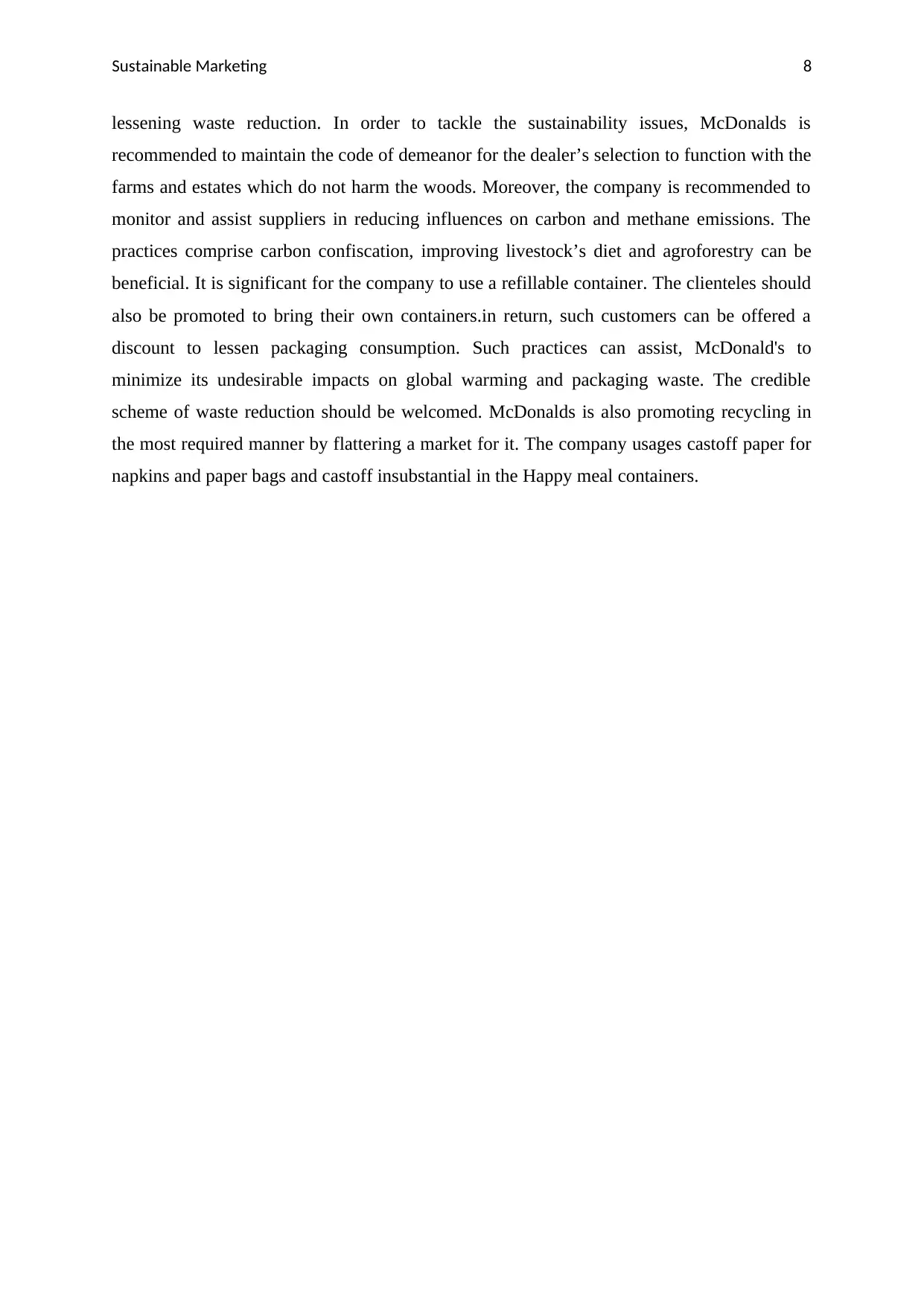
Sustainable Marketing 8
lessening waste reduction. In order to tackle the sustainability issues, McDonalds is
recommended to maintain the code of demeanor for the dealer’s selection to function with the
farms and estates which do not harm the woods. Moreover, the company is recommended to
monitor and assist suppliers in reducing influences on carbon and methane emissions. The
practices comprise carbon confiscation, improving livestock’s diet and agroforestry can be
beneficial. It is significant for the company to use a refillable container. The clienteles should
also be promoted to bring their own containers.in return, such customers can be offered a
discount to lessen packaging consumption. Such practices can assist, McDonald's to
minimize its undesirable impacts on global warming and packaging waste. The credible
scheme of waste reduction should be welcomed. McDonalds is also promoting recycling in
the most required manner by flattering a market for it. The company usages castoff paper for
napkins and paper bags and castoff insubstantial in the Happy meal containers.
lessening waste reduction. In order to tackle the sustainability issues, McDonalds is
recommended to maintain the code of demeanor for the dealer’s selection to function with the
farms and estates which do not harm the woods. Moreover, the company is recommended to
monitor and assist suppliers in reducing influences on carbon and methane emissions. The
practices comprise carbon confiscation, improving livestock’s diet and agroforestry can be
beneficial. It is significant for the company to use a refillable container. The clienteles should
also be promoted to bring their own containers.in return, such customers can be offered a
discount to lessen packaging consumption. Such practices can assist, McDonald's to
minimize its undesirable impacts on global warming and packaging waste. The credible
scheme of waste reduction should be welcomed. McDonalds is also promoting recycling in
the most required manner by flattering a market for it. The company usages castoff paper for
napkins and paper bags and castoff insubstantial in the Happy meal containers.
⊘ This is a preview!⊘
Do you want full access?
Subscribe today to unlock all pages.

Trusted by 1+ million students worldwide
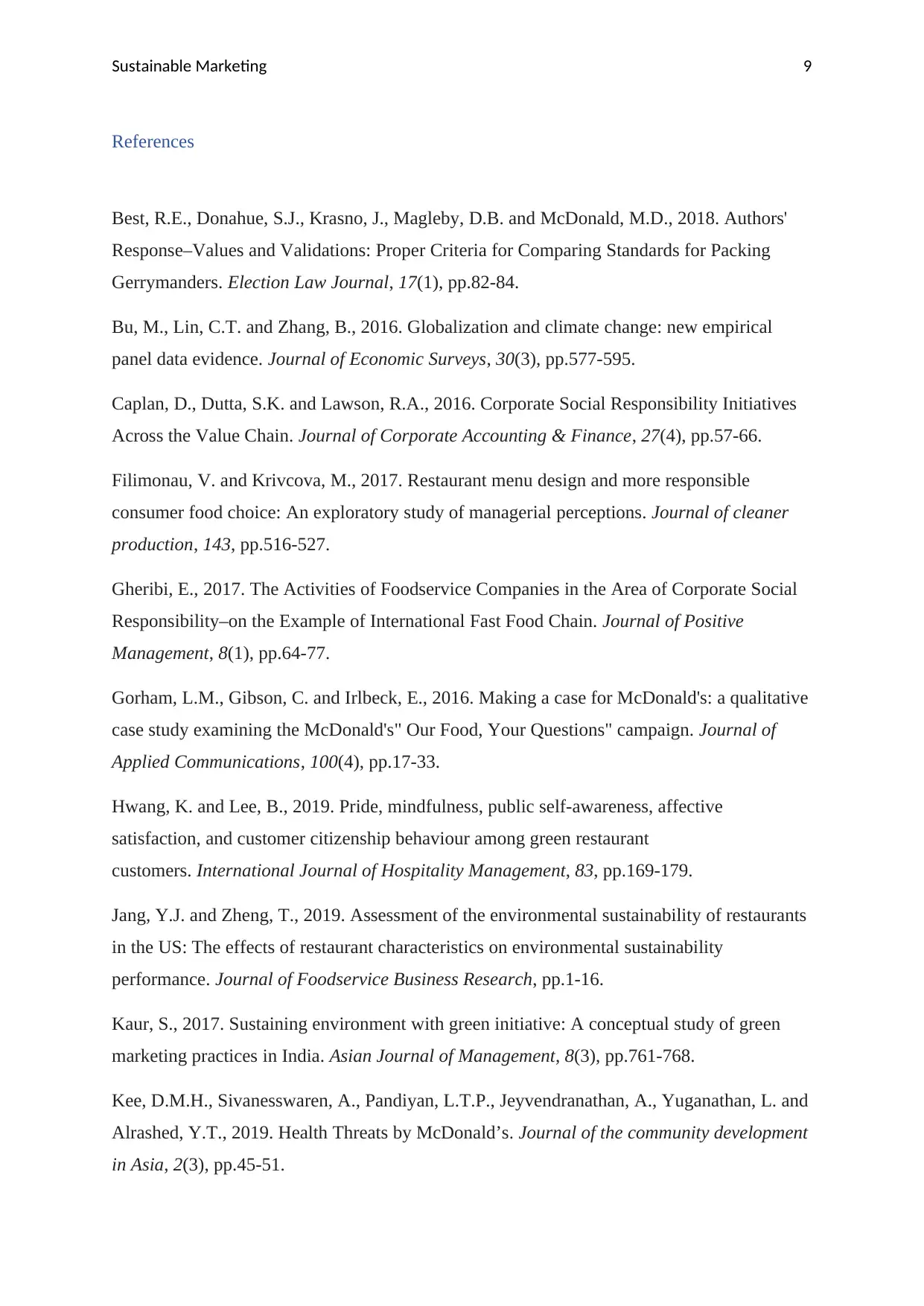
Sustainable Marketing 9
References
Best, R.E., Donahue, S.J., Krasno, J., Magleby, D.B. and McDonald, M.D., 2018. Authors'
Response–Values and Validations: Proper Criteria for Comparing Standards for Packing
Gerrymanders. Election Law Journal, 17(1), pp.82-84.
Bu, M., Lin, C.T. and Zhang, B., 2016. Globalization and climate change: new empirical
panel data evidence. Journal of Economic Surveys, 30(3), pp.577-595.
Caplan, D., Dutta, S.K. and Lawson, R.A., 2016. Corporate Social Responsibility Initiatives
Across the Value Chain. Journal of Corporate Accounting & Finance, 27(4), pp.57-66.
Filimonau, V. and Krivcova, M., 2017. Restaurant menu design and more responsible
consumer food choice: An exploratory study of managerial perceptions. Journal of cleaner
production, 143, pp.516-527.
Gheribi, E., 2017. The Activities of Foodservice Companies in the Area of Corporate Social
Responsibility–on the Example of International Fast Food Chain. Journal of Positive
Management, 8(1), pp.64-77.
Gorham, L.M., Gibson, C. and Irlbeck, E., 2016. Making a case for McDonald's: a qualitative
case study examining the McDonald's" Our Food, Your Questions" campaign. Journal of
Applied Communications, 100(4), pp.17-33.
Hwang, K. and Lee, B., 2019. Pride, mindfulness, public self-awareness, affective
satisfaction, and customer citizenship behaviour among green restaurant
customers. International Journal of Hospitality Management, 83, pp.169-179.
Jang, Y.J. and Zheng, T., 2019. Assessment of the environmental sustainability of restaurants
in the US: The effects of restaurant characteristics on environmental sustainability
performance. Journal of Foodservice Business Research, pp.1-16.
Kaur, S., 2017. Sustaining environment with green initiative: A conceptual study of green
marketing practices in India. Asian Journal of Management, 8(3), pp.761-768.
Kee, D.M.H., Sivanesswaren, A., Pandiyan, L.T.P., Jeyvendranathan, A., Yuganathan, L. and
Alrashed, Y.T., 2019. Health Threats by McDonald’s. Journal of the community development
in Asia, 2(3), pp.45-51.
References
Best, R.E., Donahue, S.J., Krasno, J., Magleby, D.B. and McDonald, M.D., 2018. Authors'
Response–Values and Validations: Proper Criteria for Comparing Standards for Packing
Gerrymanders. Election Law Journal, 17(1), pp.82-84.
Bu, M., Lin, C.T. and Zhang, B., 2016. Globalization and climate change: new empirical
panel data evidence. Journal of Economic Surveys, 30(3), pp.577-595.
Caplan, D., Dutta, S.K. and Lawson, R.A., 2016. Corporate Social Responsibility Initiatives
Across the Value Chain. Journal of Corporate Accounting & Finance, 27(4), pp.57-66.
Filimonau, V. and Krivcova, M., 2017. Restaurant menu design and more responsible
consumer food choice: An exploratory study of managerial perceptions. Journal of cleaner
production, 143, pp.516-527.
Gheribi, E., 2017. The Activities of Foodservice Companies in the Area of Corporate Social
Responsibility–on the Example of International Fast Food Chain. Journal of Positive
Management, 8(1), pp.64-77.
Gorham, L.M., Gibson, C. and Irlbeck, E., 2016. Making a case for McDonald's: a qualitative
case study examining the McDonald's" Our Food, Your Questions" campaign. Journal of
Applied Communications, 100(4), pp.17-33.
Hwang, K. and Lee, B., 2019. Pride, mindfulness, public self-awareness, affective
satisfaction, and customer citizenship behaviour among green restaurant
customers. International Journal of Hospitality Management, 83, pp.169-179.
Jang, Y.J. and Zheng, T., 2019. Assessment of the environmental sustainability of restaurants
in the US: The effects of restaurant characteristics on environmental sustainability
performance. Journal of Foodservice Business Research, pp.1-16.
Kaur, S., 2017. Sustaining environment with green initiative: A conceptual study of green
marketing practices in India. Asian Journal of Management, 8(3), pp.761-768.
Kee, D.M.H., Sivanesswaren, A., Pandiyan, L.T.P., Jeyvendranathan, A., Yuganathan, L. and
Alrashed, Y.T., 2019. Health Threats by McDonald’s. Journal of the community development
in Asia, 2(3), pp.45-51.
Paraphrase This Document
Need a fresh take? Get an instant paraphrase of this document with our AI Paraphraser
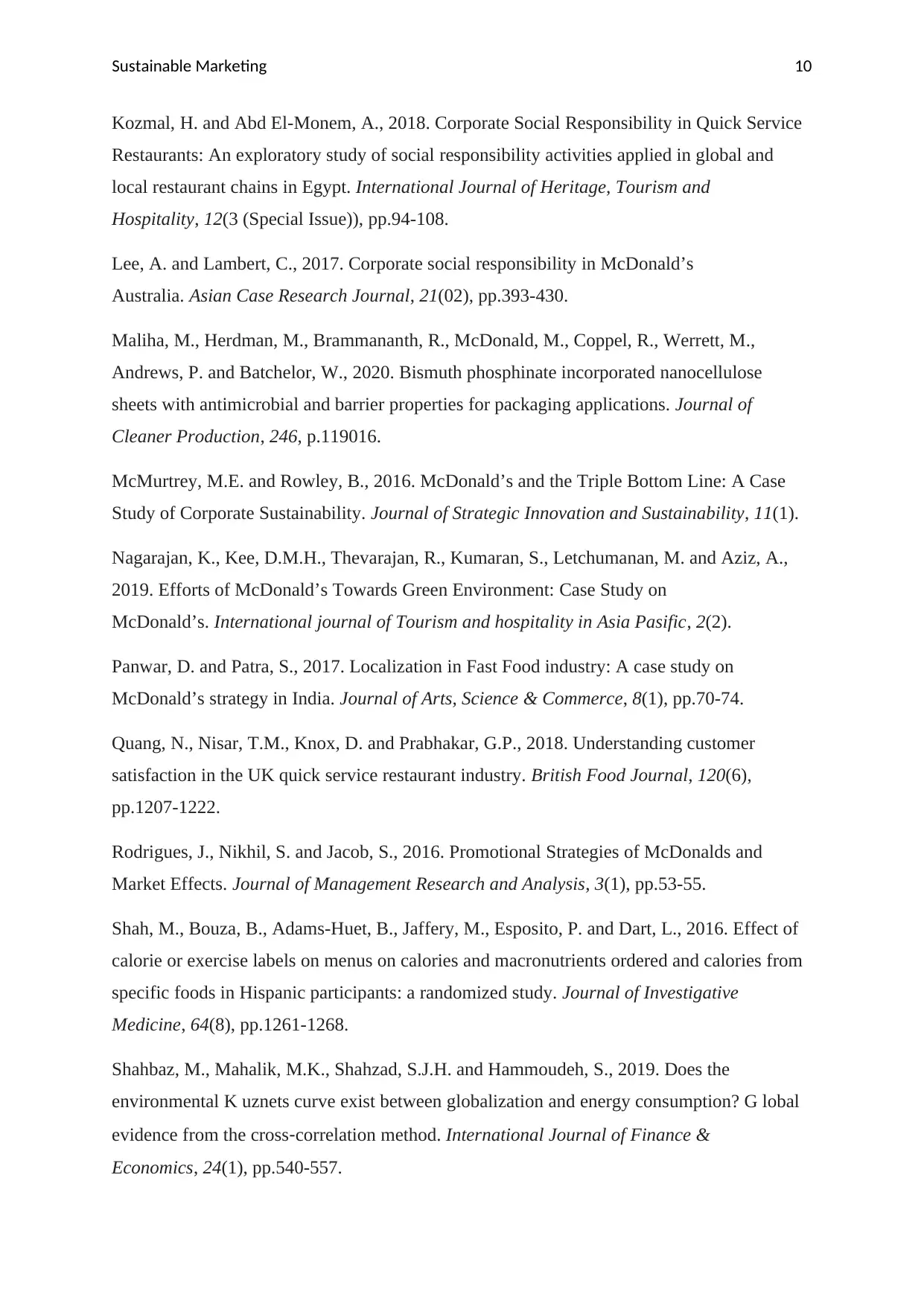
Sustainable Marketing 10
Kozmal, H. and Abd El-Monem, A., 2018. Corporate Social Responsibility in Quick Service
Restaurants: An exploratory study of social responsibility activities applied in global and
local restaurant chains in Egypt. International Journal of Heritage, Tourism and
Hospitality, 12(3 (Special Issue)), pp.94-108.
Lee, A. and Lambert, C., 2017. Corporate social responsibility in McDonald’s
Australia. Asian Case Research Journal, 21(02), pp.393-430.
Maliha, M., Herdman, M., Brammananth, R., McDonald, M., Coppel, R., Werrett, M.,
Andrews, P. and Batchelor, W., 2020. Bismuth phosphinate incorporated nanocellulose
sheets with antimicrobial and barrier properties for packaging applications. Journal of
Cleaner Production, 246, p.119016.
McMurtrey, M.E. and Rowley, B., 2016. McDonald’s and the Triple Bottom Line: A Case
Study of Corporate Sustainability. Journal of Strategic Innovation and Sustainability, 11(1).
Nagarajan, K., Kee, D.M.H., Thevarajan, R., Kumaran, S., Letchumanan, M. and Aziz, A.,
2019. Efforts of McDonald’s Towards Green Environment: Case Study on
McDonald’s. International journal of Tourism and hospitality in Asia Pasific, 2(2).
Panwar, D. and Patra, S., 2017. Localization in Fast Food industry: A case study on
McDonald’s strategy in India. Journal of Arts, Science & Commerce, 8(1), pp.70-74.
Quang, N., Nisar, T.M., Knox, D. and Prabhakar, G.P., 2018. Understanding customer
satisfaction in the UK quick service restaurant industry. British Food Journal, 120(6),
pp.1207-1222.
Rodrigues, J., Nikhil, S. and Jacob, S., 2016. Promotional Strategies of McDonalds and
Market Effects. Journal of Management Research and Analysis, 3(1), pp.53-55.
Shah, M., Bouza, B., Adams-Huet, B., Jaffery, M., Esposito, P. and Dart, L., 2016. Effect of
calorie or exercise labels on menus on calories and macronutrients ordered and calories from
specific foods in Hispanic participants: a randomized study. Journal of Investigative
Medicine, 64(8), pp.1261-1268.
Shahbaz, M., Mahalik, M.K., Shahzad, S.J.H. and Hammoudeh, S., 2019. Does the
environmental K uznets curve exist between globalization and energy consumption? G lobal
evidence from the cross‐correlation method. International Journal of Finance &
Economics, 24(1), pp.540-557.
Kozmal, H. and Abd El-Monem, A., 2018. Corporate Social Responsibility in Quick Service
Restaurants: An exploratory study of social responsibility activities applied in global and
local restaurant chains in Egypt. International Journal of Heritage, Tourism and
Hospitality, 12(3 (Special Issue)), pp.94-108.
Lee, A. and Lambert, C., 2017. Corporate social responsibility in McDonald’s
Australia. Asian Case Research Journal, 21(02), pp.393-430.
Maliha, M., Herdman, M., Brammananth, R., McDonald, M., Coppel, R., Werrett, M.,
Andrews, P. and Batchelor, W., 2020. Bismuth phosphinate incorporated nanocellulose
sheets with antimicrobial and barrier properties for packaging applications. Journal of
Cleaner Production, 246, p.119016.
McMurtrey, M.E. and Rowley, B., 2016. McDonald’s and the Triple Bottom Line: A Case
Study of Corporate Sustainability. Journal of Strategic Innovation and Sustainability, 11(1).
Nagarajan, K., Kee, D.M.H., Thevarajan, R., Kumaran, S., Letchumanan, M. and Aziz, A.,
2019. Efforts of McDonald’s Towards Green Environment: Case Study on
McDonald’s. International journal of Tourism and hospitality in Asia Pasific, 2(2).
Panwar, D. and Patra, S., 2017. Localization in Fast Food industry: A case study on
McDonald’s strategy in India. Journal of Arts, Science & Commerce, 8(1), pp.70-74.
Quang, N., Nisar, T.M., Knox, D. and Prabhakar, G.P., 2018. Understanding customer
satisfaction in the UK quick service restaurant industry. British Food Journal, 120(6),
pp.1207-1222.
Rodrigues, J., Nikhil, S. and Jacob, S., 2016. Promotional Strategies of McDonalds and
Market Effects. Journal of Management Research and Analysis, 3(1), pp.53-55.
Shah, M., Bouza, B., Adams-Huet, B., Jaffery, M., Esposito, P. and Dart, L., 2016. Effect of
calorie or exercise labels on menus on calories and macronutrients ordered and calories from
specific foods in Hispanic participants: a randomized study. Journal of Investigative
Medicine, 64(8), pp.1261-1268.
Shahbaz, M., Mahalik, M.K., Shahzad, S.J.H. and Hammoudeh, S., 2019. Does the
environmental K uznets curve exist between globalization and energy consumption? G lobal
evidence from the cross‐correlation method. International Journal of Finance &
Economics, 24(1), pp.540-557.
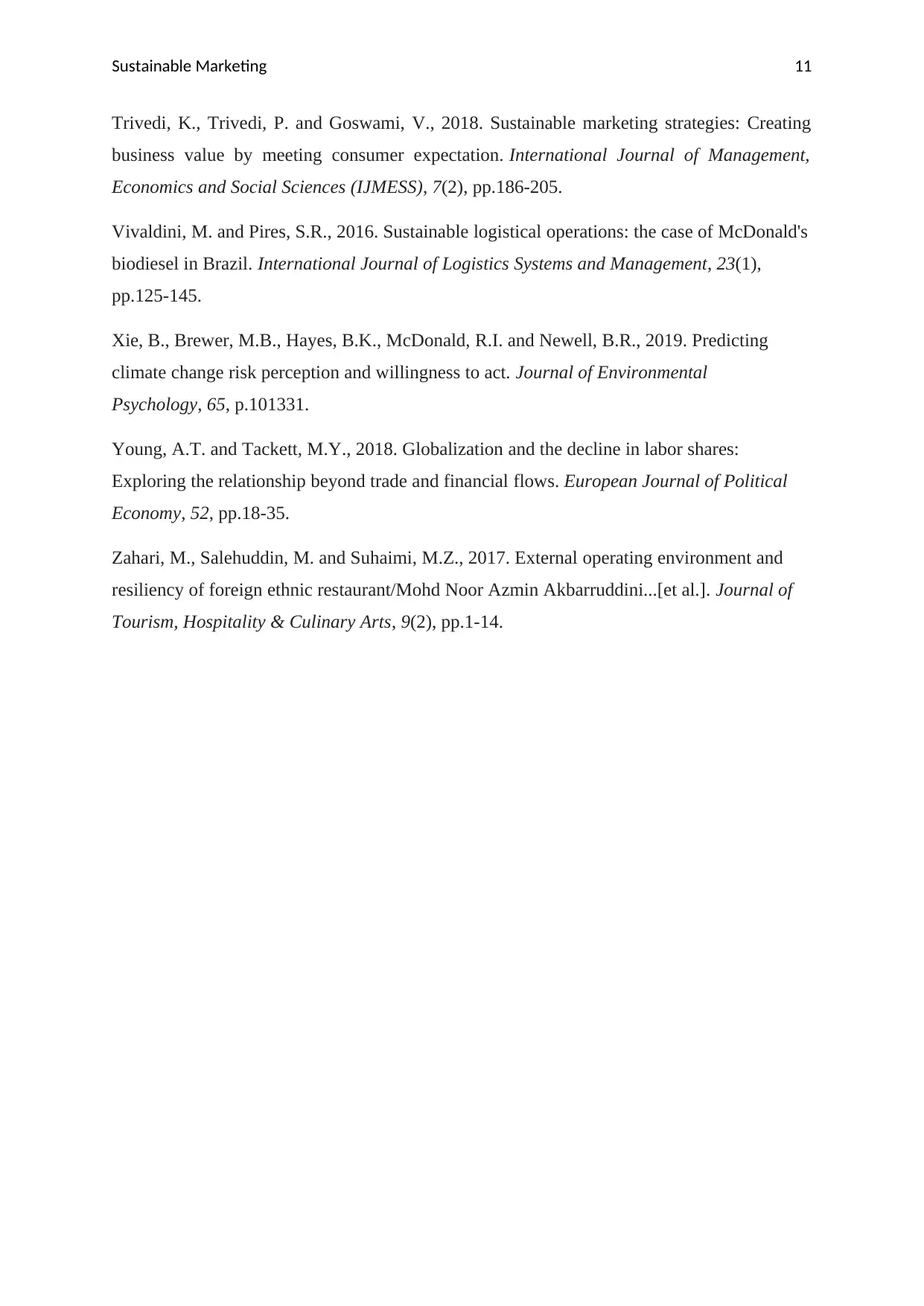
Sustainable Marketing 11
Trivedi, K., Trivedi, P. and Goswami, V., 2018. Sustainable marketing strategies: Creating
business value by meeting consumer expectation. International Journal of Management,
Economics and Social Sciences (IJMESS), 7(2), pp.186-205.
Vivaldini, M. and Pires, S.R., 2016. Sustainable logistical operations: the case of McDonald's
biodiesel in Brazil. International Journal of Logistics Systems and Management, 23(1),
pp.125-145.
Xie, B., Brewer, M.B., Hayes, B.K., McDonald, R.I. and Newell, B.R., 2019. Predicting
climate change risk perception and willingness to act. Journal of Environmental
Psychology, 65, p.101331.
Young, A.T. and Tackett, M.Y., 2018. Globalization and the decline in labor shares:
Exploring the relationship beyond trade and financial flows. European Journal of Political
Economy, 52, pp.18-35.
Zahari, M., Salehuddin, M. and Suhaimi, M.Z., 2017. External operating environment and
resiliency of foreign ethnic restaurant/Mohd Noor Azmin Akbarruddini...[et al.]. Journal of
Tourism, Hospitality & Culinary Arts, 9(2), pp.1-14.
Trivedi, K., Trivedi, P. and Goswami, V., 2018. Sustainable marketing strategies: Creating
business value by meeting consumer expectation. International Journal of Management,
Economics and Social Sciences (IJMESS), 7(2), pp.186-205.
Vivaldini, M. and Pires, S.R., 2016. Sustainable logistical operations: the case of McDonald's
biodiesel in Brazil. International Journal of Logistics Systems and Management, 23(1),
pp.125-145.
Xie, B., Brewer, M.B., Hayes, B.K., McDonald, R.I. and Newell, B.R., 2019. Predicting
climate change risk perception and willingness to act. Journal of Environmental
Psychology, 65, p.101331.
Young, A.T. and Tackett, M.Y., 2018. Globalization and the decline in labor shares:
Exploring the relationship beyond trade and financial flows. European Journal of Political
Economy, 52, pp.18-35.
Zahari, M., Salehuddin, M. and Suhaimi, M.Z., 2017. External operating environment and
resiliency of foreign ethnic restaurant/Mohd Noor Azmin Akbarruddini...[et al.]. Journal of
Tourism, Hospitality & Culinary Arts, 9(2), pp.1-14.
⊘ This is a preview!⊘
Do you want full access?
Subscribe today to unlock all pages.

Trusted by 1+ million students worldwide
1 out of 12
Related Documents
Your All-in-One AI-Powered Toolkit for Academic Success.
+13062052269
info@desklib.com
Available 24*7 on WhatsApp / Email
![[object Object]](/_next/static/media/star-bottom.7253800d.svg)
Unlock your academic potential
Copyright © 2020–2026 A2Z Services. All Rights Reserved. Developed and managed by ZUCOL.





